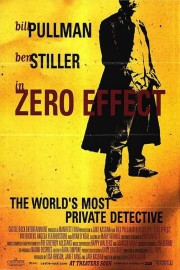Zero Effect
If this movie had come out in August or September of 1998 instead of the winter, I wonder if its box-office fate might have been better. Its January release put a stigma on it that even positive notices from critics couldn’t really change, but if it was a late Summer/early Fall release, post-“There’s Something About Mary,” would the presence of Ben Stiller might have drawn people to it? Instead, the film fell into obscurity, and is not often discussed in terms of the careers of its stars, let alone its director, Jake Kasden. Now that he’s delivered two big box-office hits with the “Jumanji” films, is there any way he could revisit this to give us another Daryl Zero mystery?
“Zero Effect” follows the brilliant detective/exasperated assistant formula of Holmes/Watson to introduce us to Daryl Zero, played by Bill Pullman in maybe his best performance. Actually, the film introduces him through the words of his assistant, Steve Arlo (Stiller), as he talks to two different people. One is a prospective client in Gregory Stark (Ryan O’Neil), a successful businessman being blackmailed; the other is his friend. Steve is beyond exasperated with Zero’s need for not just anonymity, but the constant back-and-forth he demands of Steve, which puts a hamper on his relationship with Jess (Angela Featherstone). Daryl Zero isn’t exactly paranoid; his office and home fit the stereotype of the “messy genius,” and with the way he handles himself on a case, anonymity with his clients is essential. When he meets an EMT by accident on this case, however, he finds himself closer to normal human contact than he’s ever been.
This was Jake Kasden’s first film as a writer-director, and he has his father’s talents for the minutiae of character, and attention to detail in world building; his father, of course, is Lawrence Kasden, who also started out as a director with a bit of a film noir himself in “Body Heat.” “Zero Effect” isn’t a steamy update of a well-worn genre, however, but a quirky little oddball movie that entertains with its detective story, but lands with the disarming connection between Zero and Gloria Sullivan (Kim Dickens), the EMT he meets while shadowing Stark. It’s weird to think that Kasden has gone towards irreverent studio comedies (“Bad Teacher,” “Orange County,” “Sex Tape,” “Walk Hard”), and found major success with an adventure reboot in “Jumanji,” that really don’t seem to carry a personal stamp like “Zero Effect” does; it’s unfortunate, as well, because as good as some of these films are, it’s the unique sensibilities of “Zero Effect” that make it work. Helping him in his world building is cinematography by Bill Pope which not only captures an old-school noir feel to some of the film, but also is set up for a gag at any time, and a soundtrack by that includes Elvis Costello, Nick Cave and a score by The Greyboy Allstars that set the tone for the movie.
Bill Pullman is best known, of course, for movies as diverse as “Spaceballs,” “While You Were Sleeping,” “Independence Day” and “Sleepless in Seattle,” but I don’t know that he ever had the chance to dig into a role like he does here. In a way, I think the closest thing to Daryl Zero we had gotten from Pullman previous to this film was Lone Star in “Spaceballs”; that’s broad comedy parody, however, but it’s also a shaggy take on archetypes that Pullman makes charismatic. Zero fits into the same wheelhouse, but adds a sense of loneliness and inability to interact with people that brings out some dimensions in Pullman as a performer that I don’t recall seeing before. Even then, this was one of my favorite performances of 1998, and the way he bounces off of Stiller (the straight man, which is an effective against-type casting for him) and Dickens (who is a mature, smart foil for Zero) gives this film a weight that a lesser actor, and lesser writing, would have suffocated. He’s a modern day Sherlock Holmes who, for all his quirks, still has his humanity; his reclusive nature has just repressed it.
I brought up the idea of another Daryl Zero mystery now, and I stand by that. I’d love to see Kasden, Pullman and Stiller revisit this world with another story about these characters. He has some box-office muscle behind him; it’s time for him to go personal again. Few filmmakers would be more interesting by going back to their roots decades later.










